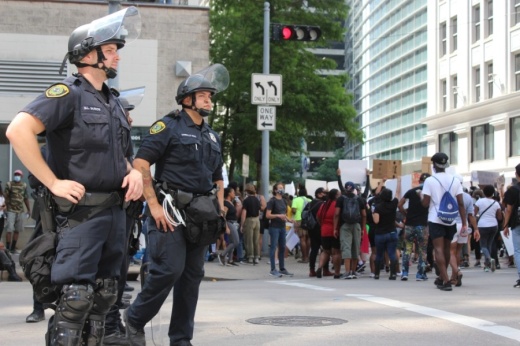Residents called into a virtual budget hearing June 3 asking for changes such as removing funding for tear gas and rubber bullets, removing funding for liability insurance for police officers and redirecting some funds to hire social workers instead of police officers.
“They have become way too militarized, and police alone can’t prevent crime. They are reactionary to it,” said speaker Tyler Wallace. “We need to change the way we approach public safety with increased social work.”
The day before, Mayor Pro Tem Dave Martin announced that a previous decision to defer all five incoming police cadet classes and furlough 3,000 city employees in the $5.1 billion fiscal year 2021 budget proposal was reversed when the city received more flexibility in spending its $404 million in CARES Act funding.
Referencing a 2016 audit from independent consulting firm PFM stating that Houston’s police force has been chronically understaffed when compared to other major U.S. cities, Mayor Sylvester Turner has made hiring additional police officers a goal during both of his terms.
Police pay
While speakers looked to the council to alter the proposed budget in ways that would boost other areas such as the library system and public health department, over 90% of the police department budget, as proposed for fiscal year 2020-21, is committed to personnel costs such as salaries and benefits.
These costs are dictated by a meet and confer agreement, a contract between the mayor and the Houston Police Officers Union that is negotiated every three years, unlike the city budget, which City Council approves annually.
The current meet and confer agreement expires December 31, 2020, and Mayor Sylvester Turner said he had entered negotiations in early 2020 but the talks were put on hold temporarily at the outset of the coronavirus outbreak.
“This is an opportunity for us to collaborate on the recommendations we can present to the mayor for the police contract so that they align with the community’s best interests,” Council Member Tiffany Thomas said.
Resident experiences
While the march for George Floyd remained largely peaceful throughout the day and late afternoon June 2 some commenters criticized police HPD’s tactics Tuesday evening when a smaller number of protesters remained downtown into the evening. Dressed in riot gear, officers arrested about 200 protesters in addition to 200 arrested Friday evening, HPD reported.
Throughout the march, Houston Police Chief Art Acevedo was seen giving impassioned speeches in support of protesters, listening to protestors and receiving a variety of responses from attendees. Some stopped for hugs and to take photos with him while others openly criticized the department’s decisions to withhold body camera footage of recent police shootings in Houston.
“There is footage and the police department is making that available to the family members themselves, and I want people to know that,” Turner said. “As recently as yesterday, family members came in, and the family asked the police not to make the video available. We can make the video available in some cases but not all.”
Other commenters expressed anger over day-to-day interactions with police presence in Houston’s lower-income neighborhoods.
“I live in Denver Harbor, Mayor Turner,” said Sabrina Perez. “I have been there when police officers have stopped someone for a citation, and six or seven police officers got there, and they were aggressive.”
To help the public better understand how to report police misconduct as well as take more feedback from residents, a Houston City Council Public Safety Committee meeting is called for June 25 and will bring in representatives of the Harris County District Attorney’s Office, the Houston Police Department and the Citizen Police Oversight Board.
“This is one of the diverse councils the city has ever had,” Thomas said. “Many of us got to this position because we were advocating for racial and social justice way before we became elected and our commitment to that has not wavered.”
Houston City Council Members are expected to complete their proposed amendments to the fiscal year 2020-21 budget by June 5 prior to a June 10 vote on the final budget. The fiscal year begins July 1.





